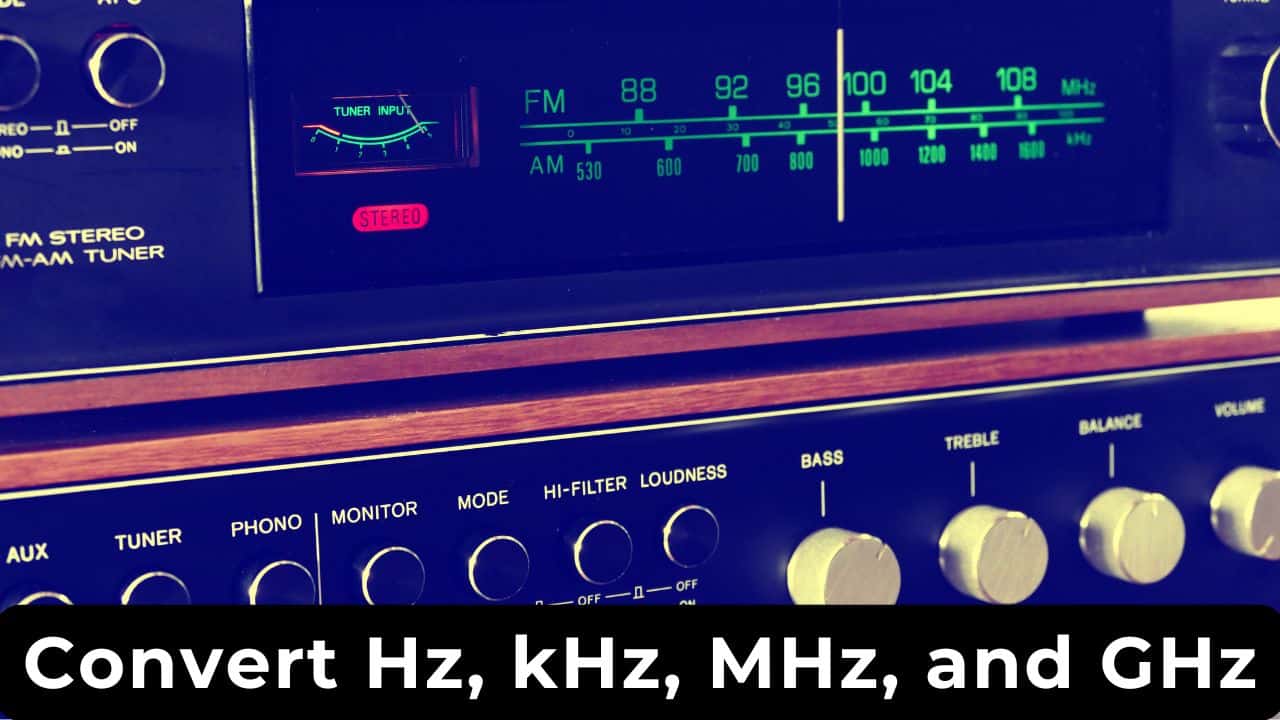
- Frequency Conversion
- Quick Conversion Formulas
- What Are Frequency Units?
- Hertz (Hz) – The Foundation
- Kilohertz (kHz) – Thousand Times Stronger
- Megahertz (MHz) – Million Cycles Per Second
- Gigahertz (GHz) – Billion Cycles Per Second
- Practical Conversion Examples
- Radio Frequency Conversion
- Processor Speed Conversion
- Audio Frequency Conversion
- Frequently Asked Questions
- Author
Frequency Conversion
Frequency conversion is essential in electronics, telecommunications, and physics. Our frequency converter helps you easily convert between Hz (Hertz), kHz (Kilohertz), MHz (Megahertz), and GHz (Gigahertz) with precision and speed.
Quick Conversion Formulas
Hz ↔ kHz
kHz ↔ MHz
MHz ↔ GHz
What Are Frequency Units?
Hertz (Hz) – The Foundation
Scientific Definition: One Hertz equals one cycle per second. Named after Heinrich Hertz, the German physicist who proved the existence of electromagnetic waves.
Real-World Examples:
- Human hearing: 20 Hz – 20,000 Hz
- AC power frequency: 50-60 Hz
- Musical note A4: 440 Hz
- Extremely Low Frequency radio: 3-30 Hz
Kilohertz (kHz) – Thousand Times Stronger
Scientific Definition: 1 kHz = 1,000 Hz. The “kilo” prefix means thousand, making calculations easier for medium-frequency applications.
Common Applications:
- AM Radio: 530-1700 kHz
- Audio sampling: 44.1 kHz (CD quality)
- Switch-mode power supplies: 20-100 kHz
- Ultrasonic cleaning: 20-40 kHz
Megahertz (MHz) – Million Cycles Per Second
Scientific Definition: 1 MHz = 1,000,000 Hz. “Mega” means million, used for high-frequency applications in radio and computing.
Where You’ll Find MHz:
- FM Radio: 88-108 MHz
- Computer processors: 1-5000 MHz
- VHF TV channels: 54-216 MHz
- Gaming consoles: 733-3800 MHz
Gigahertz (GHz) – Billion Cycles Per Second
Scientific Definition: 1 GHz = 1,000,000,000 Hz. “Giga” means billion, representing the highest frequencies in everyday technology.
GHz in Modern Technology:
- Cell phones: 0.8-5.8 GHz
- WiFi: 2.4 & 5.8 GHz
- Satellite communication: 1-40 GHz
- Microwave ovens: 2.45 GHz
Practical Conversion Examples
Radio Frequency Conversion
Problem: Convert FM radio frequency 101.5 MHz to Hz
Step 1: 101.5 MHz = 101.5 × 1,000,000
Result: 101,500,000 Hz
Processor Speed Conversion
Problem: Convert 3.2 GHz processor to MHz
Step 1: 3.2 GHz = 3.2 × 1,000
Result: 3,200 MHz
Audio Frequency Conversion
Problem: Convert 48,000 Hz (audio sampling) to kHz
Step 1: 48,000 Hz ÷ 1,000
Result: 48 kHz
Frequently Asked Questions
Q: Why do we need different frequency units?
A: Different units make it easier to work with numbers in their appropriate range. It’s much simpler to say “2.4 GHz” than “2,400,000,000 Hz”!
Q: Which frequency unit is most commonly used?
A: It depends on the application. MHz is common for radio frequencies, GHz for modern computing, and Hz for audio and power applications.
Q: How accurate do frequency conversions need to be?
A: Accuracy depends on your application. For general calculations, 3-4 significant figures are usually sufficient. For precision work, more decimal places may be needed.
